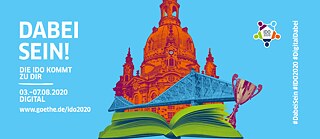Internationale Deutscholympiade
“BE THERE!” Digitally Worldwide

From 3 to 7 August, the Internationale Deutscholympiade (IDO), the world’s largest contest for the German language, took place in the digital space for the first time. But how do you organise a competition with more than 120 pupils from 60 countries and 17 time zones?
By Aimée Torre Brons
The in-person event in Dresden was already in the starting blocks when, within a few months, it had to be converted to a completely digital format. The participants came from countries ranging from New Zealand, Japan and India to Kazakhstan, Finland and Portugal, to South Africa, Peru and Canada. Dividing up the online contest for three language levels (A2, B1 and B2) into 17 time zones with tailor-made group assignments for all participants was a mammoth task in itself.
The Goethe-Institut Dresden served as the live studio, creative office and hub of media attention. It was where all the threads came together; digital programmes that tied into the city were developed, the contest was co-supervised by numerous jurors and the daily live stream programme with studio guests on site was broadcast around the world at 1 p.m. (CEST). That was six in the morning for 17-year-old Abraham from Mexico and eight in the evening for Hana, also 17, from Japan. But that didn’t stop either of them from being there.

Digital dancing, chatting in German
Winningly moderated by the Dresden artist and entertainer Falk Töpfer, the live stream quickly became a popular format. And who would have imagined that so many of the pupils at their screens would be willing to take part in the dance workshop with break-dancer Philip “Lehmi” Lehmann from the Dresden breakdance group The Saxonz? A new star in the entertainment world was born with the improvised dance performance by presenter Falk Töpfer. From then on, the pupils in the chat group clamoured, “Please, Falk, dance!” In between was intensive communication and networking, sometimes in Latin for fun. The favourite language, however, remained German, because, as Keta Kalandadze from Georgia (1st place in level B2) said, “the German language has managed to bring people from every corner of the world together and enable them to establish new relationships.”
Even television was there
Under the motto “BE THERE! – IDO is coming to you,” the competition offered numerous opportunities for encounters and networking. Participants introduced themselves in online videos, talked about their country and thus also promoted intercultural competence amongst one another. Everyone had already introduced themselves in profiles on the project website where one could find out that computer enthusiast Eban Ebssa (1st place in level A2) from the USA learned via the German language, “that a ‘Handschuh’ really is a shoe for your hand!” She also told the MDR television team about it in a Skype interview.
In general, media interest in the international youngsters and the IDO was very high. Aryan from India was interviewed on the national news programme Tagesschau, participants from all five continents told the taz “why we like to speak German” and Khang from Vietnam told the local Sächsische Zeitung what he loves about Germany. Like almost all of the participants, he hopes to study here one day. This year, the IDO, which has long been an “export hit” for the German language and Germany as an educational location, turned out to be a media “import hit.” It was characterised by creativity, innovativeness and learning opportunities for everyone involved. “You’re my favourite subject,” one participant wrote in the chat at the end. And Falk danced once more for everyone.
Aimée Torre Brons is a freelance cultural and media manager as well as an author and editor. She was responsible for the project presswork for IDO 2020.